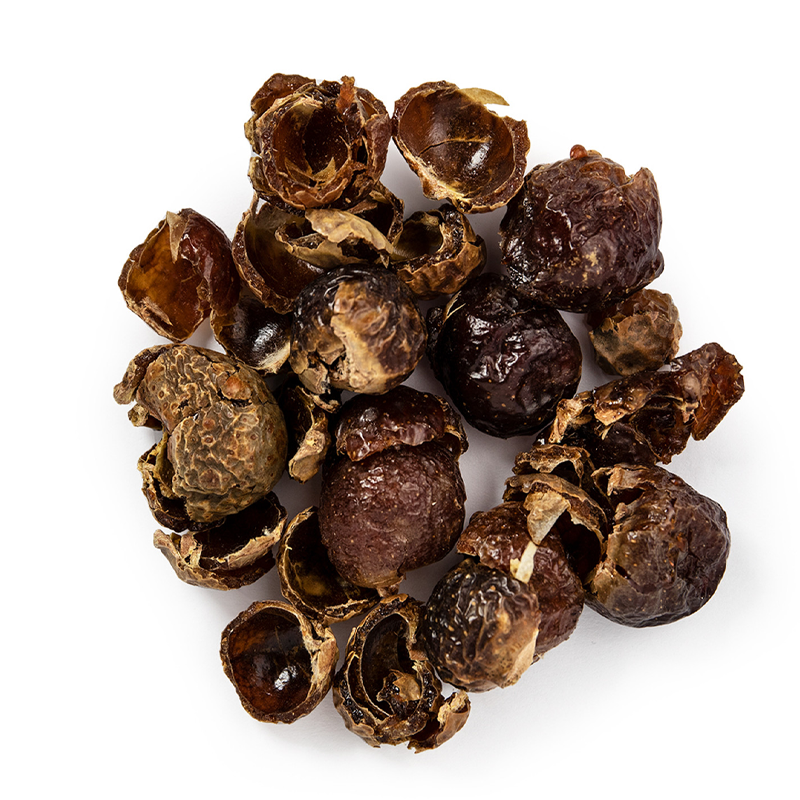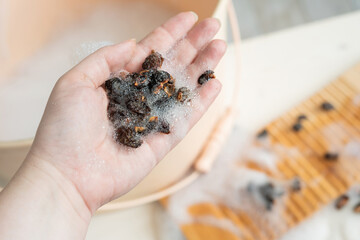Sustainability And Eco Friendliness:
In an era where sustainability and eco-friendliness are at the forefront of consumer consciousness, individuals are increasingly seeking natural alternatives to conventional household products. One such marvel of nature is soap berries, also known as soap nuts. These small, berry-like fruits contain saponin, a natural surfactant that creates a lather when mixed with water, making them a perfect substitute for chemical-laden detergents and cleaners.
Knowledge About Soap Berries:
Before delving into their practical uses, it’s crucial to comprehend the nature of the fruit from the Sapindus genus tree and its functioning. These fruits are predominantly found in regions like India and Nepal. They contain saponin, a compound known for its natural cleansing abilities. Saponin functions by reducing the surface tension of water, enabling it to effectively infiltrate fabrics and remove dirt and grime.

Laundry Care with Soap Berries:
One of the most widely adopted applications of soap grapes is in laundry care. Utilizing them for laundry is straightforward and efficient. Begin by placing several berries in a cotton drawstring bag or directly into the washing machine. For a standard load, 4-6 berries should suffice. Run the wash cycle as usual, and the saponin released from the berries will effectively clean your clothes without the need for additional detergent. This natural cleaning method is gentle on fabrics, making it suitable for sensitive skin and delicate clothing items.
All-Purpose Cleaning Solutions:
Soap grapes have a wide range of applications beyond just laundry care. They can also serve as the basis for creating versatile cleaning solutions for various surfaces in your home. To concoct a simple cleaning solution, simmer a handful of these berries in water for approximately 15-20 minutes. After cooling, strain the liquid and transfer it into a spray bottle. This natural solution is suitable for cleaning kitchen countertops, bathroom tiles, and floors. Moreover, you can augment its cleaning effectiveness by incorporating essential oils with antibacterial properties, such as tea tree oil or lavender oil.
Dishwashing With Soap Nuts:
Say goodbye to dishwashing detergents filled with chemicals and welcome the natural cleaning capabilities of soap grapes. To utilize them for dishwashing, just place several berries in a muslin bag and add them to your dishwasher’s utensil basket or directly into the sink when washing dishes by hand. The saponin released from these berries will efficiently remove grease and dirt, leaving your dishes impeccably clean with no leftover residue.
Personal Care Applications:
In addition to household cleaning tasks, the liquid extracted from soap grapes can also be included in your personal care regimen. You can utilize this liquid as a mild shampoo and body wash, suitable for all skin types, including sensitive skin. To use, dilute the liquid with water and apply it to your hair and body as you normally would with regular shampoo or body wash. The inherent cleansing qualities of this liquid will leave your skin and hair feeling refreshed and clean.
Environmental Benefits of Soap Berries
Beyond their effectiveness in cleaning and personal hygiene, these natural grapes, known as Sapindus genus tree fruits, offer numerous environmental advantages:
Completely Biodegradable:
These natural fruits from the Sapindus genus tree undergo decomposition in a manner that is entirely natural, leaving behind no harmful residues or substances that could contribute to environmental pollution. As they break down, these fruits release their components into the surrounding environment, where they undergo biodegradation without causing harm. This process ensures that there is no accumulation of waste or pollutants that could adversely affect ecosystems. Instead, the breakdown of these fruits contributes to the replenishment of nutrients in the soil, supporting the growth of plants and fostering a healthy environment. By decomposing naturally, these fruits play a vital role in maintaining ecological balance and sustainability, demonstrating their inherent ability to integrate harmoniously into the natural world without causing harm.

Free From Harmful Chemicals:
These natural fruits from the Sapindus genus tree undergo decomposition in a manner that is entirely natural, leaving behind no harmful residues or substances that could contribute to environmental pollution. As they break down, these fruits release their components into the surrounding environment, where they undergo biodegradation without causing harm. This process ensures that there is no accumulation of waste or pollutants that could adversely affect ecosystems. Instead, the breakdown of these fruits contributes to the replenishment of nutrients in the soil, supporting the growth of plants and fostering a healthy environment. By decomposing naturally, these fruits play a vital role in maintaining ecological balance and sustainability, demonstrating their inherent ability to integrate harmoniously into the natural world without causing harm.
Sustainable harvesting practices:
The fruits of the Sapindus genus tree are frequently gathered through sustainable methods like handpicking or employing low-impact farming techniques. These practices are crucial for preserving natural ecosystems and providing support to local communities. By utilizing these methods, we can ensure that harvesting activities do not cause significant harm to the environment or disrupt the delicate balance of ecosystems. Furthermore, the employment of sustainable harvesting practices helps maintain biodiversity and promotes the long-term health of natural habitats. Additionally, by supporting local communities, these practices contribute to the economic well-being of the people involved in the harvesting process, fostering a more sustainable and equitable society.
Biodiversity conservation:
By promoting the use of soap grapes, we can reduce the demand for chemical-based cleaning products, thus minimizing the negative impact on biodiversity and protecting delicate ecosystems.
Additionally, the cultivation and use of soap grapes contribute to the following environmental benefits:
Reduced Carbon Footprint:
Soap grapes require minimal processing and transportation compared to synthetic cleaning products, resulting in lower greenhouse gas emissions.
Soil Conservation:
Sustainable harvesting practices help maintain soil fertility and prevent erosion, ensuring the long-term health of agricultural lands.
Water Conservation:
Soap grapes require less water to grow compared to crops that are heavily reliant on irrigation, thereby reducing pressure on freshwater resources.
Cleaning And Personal Grooming:
In a world inundated with synthetic chemicals and pollutants, soap grapes stand out as a beacon of natural cleansing power. From laundry care to household cleaning and personal grooming, the versatility of soap grapes knows no bounds. By incorporating soap grapes into your daily routine, not only are you choosing a safer and more eco-friendly alternative, but you’re also contributing to the preservation of our planet’s precious resources.







